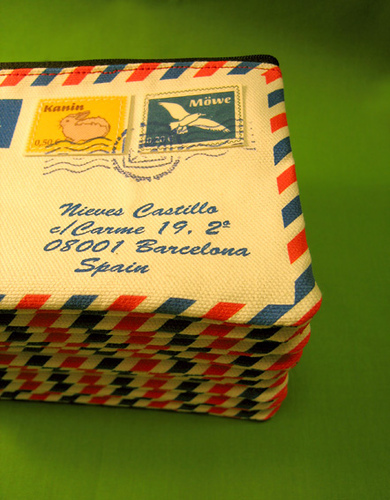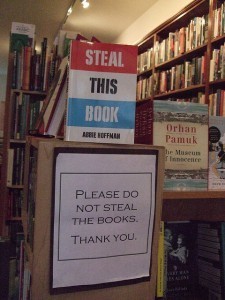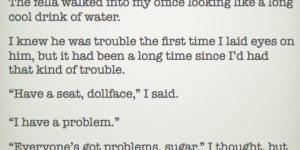M. Darusha Wehm's Blog, page 14
March 8, 2013
I’ve Got a Plan – Plan B!
 Today my newest venture, Plan B Magazine, officially launched! If you like mysteries, crime stories or suspense tales, check it out. There will be a new story every two weeks, thirteen stories in total for the first volume.
Today my newest venture, Plan B Magazine, officially launched! If you like mysteries, crime stories or suspense tales, check it out. There will be a new story every two weeks, thirteen stories in total for the first volume.
And coming soon: the whole baker’s dozen collected into an ebook anthology.
March 2, 2013
2012 Reads in Review

Photo by Enokson
Yeah, it’s a little late, but awards season is making me think of the books and stories I read last year. So, better late than never, right?
According to Goodreads, I read 36 books last year. I know that’s not an accurate representation – some of those were books I abandoned, skimmed or dipped into for research. On the other hand, I read a lot of short fiction which is mostly not represented in that number.
Long fiction:
The real standout reads for long fiction were: The Windup Girl, Reamde, Zoo City, Wool Omnibus and World War Z. Yeah, that’s almost 1/6 of the books I read. What can I say, I have a lot of books to choose from and I try to read stuff that I think will be great. These were definitely great.
The Windup Girl by Paolo Bacigalupi: This is one of those polarizing books: either you love it or hate it. I found it disturbing, disheartening and a bit deranged. I liked that it dealt with the mundane issue of the need to feed and power human civilization and took that to an insane but plausible place. Some critics found the book to have racist and sexist elements but I thought that those aspects belonged to the extremely flawed perspective characters rather than the novel itself.
Reamde by Neal Stephenson: This was a fun read, with much less in the way of Big Ideas™ than the standard Stephenson book. In fact, I wonder if the whole thing was written entirely tongue-in-cheek for the everything is so ironic crowd. (from my Goodreads review)
Zoo City by Lauren Beukes: The writing is crisp, vivid, funny and lurid. You feel like you can smell the scenes, they are so well-defined. The fantasy aspect mostly didn’t even bother me much, as it was poetically metaphoric rather than the tepid wish-fulfillment of many fantasy stories. In fact, I kind of love the idea that guilt can be made manifest. This book asks the question “what would it be like if you couldn’t hide your guilt?” The answer is more disturbing that you’d think. (from my Goodreads review)
Wool Omnibus by Hugh Howey: This collection of five short stories got a lot of hype in the indie book world and so I was skeptical. The hype was right for once. Wool is an onion story, the layers peeling off in each short piece, so much so that it’s hard to talk about what it’s about. People live in an underground silo in a state of fear. The outside Earth is poisoned and an entirely new community has arisen. Then we find out what’s really going on. Well crafted both in prose and worldbuilding, this is truly a different story. So well done that I gasped aloud at the prestige at then end of the first story.
World War Z by Max Brooks: I prefer my zombies on film, so I wasn’t expecting to love WWZ. But it’s less about zombies than it is about the sociopolitical state of the world and how we would really cope with a global emergency. It’s probably a great book for fans of explorations of military tactics as much as it is for horror nuts.
I did read two books this year that deeply disappointed me: Super Sad True Love Story and Blackout.
Super Sad True Love Story by Gary Shteyngart: This was recommended to me by a fan of my own books, and I can see why. The future issues that are explored are similar and there’s a certain urban similarity. But I couldn’t help but completely despise both perspective characters and by halfway though the story, I almost hoped something awful would happen to them. There just wasn’t enough depth to them for me to care.
Blackout by Connie Willis: This is the first part of a two parter, which I knew going in, but I was still caught off guard when there just stopped being words rather than even a hint of an ending.
I strongly dislike books and film that do this, but I’d have been willing to go on and read All Clear if the story in Blackout was at all interesting. The characters were annoying at best (seriously, WWII “historians” who don’t know anything about the war beyond their own small area of interest? really?), and utterly innocuous at worst. Their individual perils were real enough, but it was hard to care much about them when all the peripheral characters were in more danger. The overarching mystery didn’t really grab me either. It is shocking to me that this won any award at all let alone three major ones.
Short fiction:
Since I didn’t track most of the short fiction I read, I’m relying mainly on memory for the great shorter pieces. Off the top of my head, I was really impressed by Simon Petrie’s novella Flight 404 (free until March 5, go get it now!!) and Immersion by Aliette De Bodard.
Flight 404: A serious, rock solidly hard SF tale of fundamentalism, greed, space travel and authenticity. Charmain, the narrator, is a believable, flawed and complex character, who finds herself in her abandoned homeland in the middle of a search for a missing spaceliner. In the process, she is forced to deal with her past – the people she left behind when she left her home and the reasons she felt she could no longer stay.
On the face of it, this story is about what happens to the missing spaceship, but it’s really about how the choices we make affect our futures, how we interact with the memories of people from our past, how we strive to be true to ourselves. While fundamentally a story about people, Flight 404 doesn’t disappoint in the science department. Science literally solves the puzzle. (from my Goodreads review)
Immersion: This story is on a lot of people’s nomination lists this year and I think it will probably win the Hugo or Nebula or both. It’s got it all: the SF elements are integral to the story, but it’s not a “look at my cool/horrible imagined future and oh by the way here’s a plot to go with that” kind of story at all. It’s a very human, poignant, relevant and emotional story without being sappy or overly didactic. And it’s mechanically beautifully written to boot.
February 21, 2013
Why We Should Stop Talking About Young Adult and New Adult

photo credit: lloydi via photopin
I have a rule about responding to Someone Being Wrong on the Internet: just don’t. But if that doesn’t work, at least wait a while. There’s plenty of negativity in the world, and most things don’t really need someone else piling on just to say Nooo! But, there are exceptions.
I’ve talked before about how genres in fiction are more about marketing than the actual content of the story. I’d even argue that if a book can be easily put in only one little box, it’s probably not much of a story. I mean, what science fiction story doesn’t have at least a hint of mystery, romance or adventure?
But there are even more pernicious forms of genrefication (yeah, I just made that word up, but it works) – categories of who the fiction is supposed to be for. You might think I’m about to rail against Men’s Adventure here, but anyone with a clue knows that one is just dumb. Nope, I’m here to complain about everyone’s favourite darling, Young Adult fiction and its creepy uncle New Adult.
If you’ve not heard of New Adult before, here’s how Chris Fox described it on Google+ (aside: he’s smart and erudite and if you’re interested in independent authoring or writing in general, you should probably follow him):
The NA genre encompasses young people who aren’t teenagers, but aren’t yet adults either. Here is a quote from the NA Alley giving their description: “Typically, a novel is considered NA if it encompasses the transition between adolescence—a life stage often depicted in Young Adult (YA) fiction—and true adulthood… NA characters are often portrayed experiencing: college, living away from home for the first time, military deployment, apprenticeships, a first steady job, a first serious relationship, etc.”
I like what Chris has to say most of the time but this made me nearly have an Internet spaz. But, as per rule #1, I let it go. Then about a week later I read this article in SF signal about YA (I know, I shouldn’t have looked. But what has been seen cannot be unseen). And still I waited. But I can’t stop thinking about it, so here we go.
Obviously, this is all about marketing. The whole idea of rebranding something as YA makes that very clear. It’s part of the “discoverability problem” which gets a lot of play in publishing circles. Some folks frame it as a problem for readers – the difficulty of finding books you want to read. Thats’s how YA and NA are being discussed in a lot of venues, as genres that let readers know that they’re going to get something to which they can relate. Of course, both sides of this argument are just plain wrong.
Discoverability isn’t a problem for readers, it’s a problem for authors and publishers. As Guy LeCharles Gonzalez said in this post, readers don’t have a problem finding things to read. Publishers and authors, however, have a hell of a time getting their books discovered. So pretending that there’s some kind of shortage of books for particular readers, then helpfully pointing out that “oh yeah, my book is one of those,” seems like a good marketing tool. And it probably is, if by “good” we mean useful.
But the issue is that it is inherently offensive to imply that teens and (lord love a duck) people in their 20s need to be marginalised because they can’t handle the truth general fiction.
If you think I’m overreacting, read this bit of the SF Signal article which really got my blood boiling:
I think publishers are catching on to the grey area of the YA classification and have created the “New Adult” category for novels that are a little too mature for the younger set, but not mature enough for the adult market.
- Jake Bible
Are you fucking kidding me? Regardless of the poor opinion of people in their early 20s going on here, I remember being 13 perfectly well and there isn’t a single book I would read today that I couldn’t have read then. And I can hear all those arguments that some teens have different interests and reading levels and blah blah blah, but so do readers in their 50s. People should have access to all kinds of books and stories, regardless of their age.
Some folks like simpler stories than others, some folks like “literary” books, some folks like action and some folks don’t. Vive la différence. But it’s wrong to suggest that our preferences are signs of maturity (or lack thereof) when we’re all old enough to run for office, so why do we feel like it’s okay to talk about younger readers as if they can’t handle mainstream fiction? Do we really think that teen readers are going to lose their minds if they see the word fuck? Is this all just some kind of pernicious morality enforcement? And if so, how does that work for New Adult at all?
It’s one thing to label books for little kids, I get that. But while Young Adult doesn’t literally mean 18-22 year olds, it does mean people over age 12. Sure, some 13 year-olds aren’t going to be interested in a book like, say, Cryptonomicon, but some are. And there’s no reason why they shouldn’t be exposed to as many different kinds of books as possible. Reading is how we learn about people who are different from us, and we all need that lesson regardless of how old we are.
It seems patently obvious that constructions like YA and NA are offensive to their target audiences. But they are also offensive to the authors of those books. The whole marketing machine behind these genres is that these stories are acceptable for this age-specific market, meaning that they must be inherently different than mainstream stories. The clear subtext is that they are simpler, less complex, less good stories. Even though that’s also patently untrue.
Love it or hate it, but if The Catcher in the Rye were written today, it would be marketed as YA. Do we really think that this Salinger classic is “not mature enough for the adult market?” What about William Golding’s Lord of the Flies?
Teens have a tough enough time as it is, let’s not insult them by implying that they need special books for their special minds, just because we need a better marketing tool. It’s just rude.
February 13, 2013
Join my Mailing List

photo credit: 'smil via photopin
Do you want to keep up to date with my new releases? Want to be the first to know when I have a new story in a magazine, release a new book or finally decide to cryogenically freeze myself until I can easily just go live in space?
Join my mailing list. Just fill out the form below or click here.
I promise you’ll hardly ever hear from me, just when there’s news.
Email Address
First Name
Last Name
Email Format
html
text
mobile
February 6, 2013
Thoughts on File-Sharing
 Chuck “if you aren’t reading his blog, you are totally missing out” Wendig has issued a call to arms (call to pens?) for authors to talk about why people shouldn’t illegally share digital book files. I’m probably not going to do that, exactly, but here’s my post on that subject. I’ve touched on this before, but maybe Chuck is right and it’s time to make my thoughts clear.
Chuck “if you aren’t reading his blog, you are totally missing out” Wendig has issued a call to arms (call to pens?) for authors to talk about why people shouldn’t illegally share digital book files. I’m probably not going to do that, exactly, but here’s my post on that subject. I’ve touched on this before, but maybe Chuck is right and it’s time to make my thoughts clear.
First, let’s stop calling it piracy. As a cruising sailor, real piracy affects my life directly. I personally know people who were held hostage by pirates; friends of friends were murdered by them (1). Equating the illicit sharing of digital media with the violent hostage and murder trade is inaccurate, unhelpful and borderline offensive.
So, what about sharing files? Does it piss me off if people are trading my books instead of buying them? Not really. Would I rather that everyone who wanted one bought a copy? Of course I would.
The truth is that I don’t really think that file sharing is a problem. Does it devalue art, by creating the conditions where people believe that entertainment should be free? I suppose it could, but I don’t think there’s any evidence of that. People still pay top dollar to go to the cinema or own copies of films, people buy music and go to shows, people buy books. People spend massive amounts of money on entertainment; I just don’t see that changing.
Sure, there are some people who won’t pay for anything they could get for free. I’m never going to sell a book to those people, so why should I fight it? Most people, though, resort to illegal file sharing because they don’t care that much about the product in the first place or it’s the easiest (sometimes only) way to get it.
I know that I’m competing with free, so I price my books reasonably and make them available in all storefronts I can find and in all formats. It’s easier to just buy one of my books than to find a free file-sharing version.
But, if you really don’t want to pay, there’s no point in me getting all worked up about it. If your friend gives you my books on a usb stick or lends you the paperback, I’m cool with that. In fact, I encourage it. More readers is great! If you get a copy of my book on some weird forum or file sharing site, well, okay. If you like it, leave a review somewhere or tell your friends or buy one of my other books.
And if you’re actually totally broke, seriously don’t buy my books – buy some beans and rice with that three bucks. If you’re broke but really want to read my books, send me an email and I’ll give you copies for free.
January 31, 2013
The first Plan B story is up!
The first story on my new magazine is up and available to read.
I loved this story from the first sentence. Maybe it was the nautical talk, maybe it was the atmosphere, maybe it’s because you could just tell that things were not going to go well. Deliciously not well.
January 23, 2013
No News is… No News

photo credit: Esthr via photopin
Attentive readers might be wondering where the new book is. After all, it’s a new year, and I do usually release a new novel in the new year. So, what gives?
Well, the quick answer is that my previous schedule is no longer my usual schedule. I finished the first final drafts of two novels in December, so they are now being read by beta readers and getting ready for whatever final lives they will have. I’m not sure exactly what I’m going to do with them, either, since neither of them are Dex books. One of them isn’t even genre fiction. When I know, you’ll know, but for now there’s no new novel news.
What about Dex?
People specifically ask me when the next Dex book is coming out, and the answer is I don’t know. I don’t even know if there will be a next Dex book. At the end of The Beauty of Our Weapons things are changing for Dex and co. and I’m not sure where they are going from there.
I don’t want to be one of those writers who keeps churning out series books just to ride the wave – if I don’t have a great story I need to tell about Dex, I’m not going to write a Dex book. So, we’ll see. I’m not saying there won’t be any more, I’m just saying that if there are more, I don’t know when they’ll materialize.
So while there’s no news in this post, I’m not idle over here. I’ve also got short stories on the go and another project to keep me busy. Hopefully there will be new stuff for you to read soon. For some value of soon anyway.
In the meantime, I’ve posted The Interview, a short story not about Dex but set in The Cubicle Men universe. It was originally published in Podioracket Presents – Glimpses, an anthology of stories by podiobooks authors giving a taste of the worlds of their novels. I hope you like it.
January 16, 2013
My awards-eligible publications
In case anyone is inclined to nominate anything, here’s a list of my publications this year that are eligible for awards.
Novel:
The Beauty of Our Weapons, 2012
Novelette:
“Fire. Escape.” November 2012
Short story:
“The Care and Feeding of Mammalian Bipeds, v. 2.1.” Escape Pod. November 2012
“Modern Love.” Andromeda Spaceways Inflight Magazine. May 2012
“I Open My Eyes.” Luna Station Quarterly. March 2012
All of the above are eligible for the Hugos, Nebulas and Sir Julius Vogel Awards. Anyone can make a nomination for the Vogels but only members of SFWA can make nominations for the Nebulas.
I am also in my first year of eligibility for the John W. Campbell award. The criteria to nominate for the Hugos and the Campbell award are:
Any person who was or is a member of the 2012, 2013, or 2014 Worldcons as of January 31, 2013, is eligible to nominate for the 2013 Hugo Awards. (Even if you’re a member of more than one of those three Worldcons, you may only cast one nominating ballot.) If you are not a member of any of those conventions, you may join LoneStarCon 3 or Loncon 3, the 2014 Worldcon, before January 31, 2013 to become eligible. (from the Hugo Awards site)
January 7, 2013
Time to Execute Plan B
And, we’re off! The fundraising to support Plan B becoming a paying market for mystery and crime ficiton has begun. If you’re a reader, you can get pre-orders for the ebook anthology, and anthology subscription and exclusive paperbacks.
For indie authors or anyone else with something to promote, there’s also an affordable sponsorship option available.
If you want to follow the progress of the campaign, or just want to bookmark the page for future story-reading time, go to plan-b-magazine.com. There are a bunch of subscription options there to keep you up to date.
In the meantime, enjoy the video I made for the campaign:
December 19, 2012
Announcing My New Mysterious Project
 Astute readers may have guessed that I’m up to something a bit mysterious. And while I’m going to tell you what’s going on, that won’t end the suspense. In fact, I hope, it will only make things more thrilling.
Astute readers may have guessed that I’m up to something a bit mysterious. And while I’m going to tell you what’s going on, that won’t end the suspense. In fact, I hope, it will only make things more thrilling.
Okay. Enough beating around the thesaurus. I am pleased to announce my new project: Plan B Mystery Magazine.
In the new year, Plan B will be posting weekly short fiction in the mystery, crime, suspense and thriller genres, free to read online. We will also be compiling the stories into quarterly anthologies which will be available as ebooks. An annual subscription to the anthologies will be available for purchase as will the individual anthologies.
As you know, I believe that quality work should be compensated, so we intend for Plan B to be a semi-pro paying market. To that end, we will be launching an IndieGoGo campaign in January 2013 to raise the funds necessary to pay our authors.
Want to be a part of it? If you’re a reader, just hang on. When I launch the campaign there will be lots of opportunities to contribute and get great goodies. If you are a writer or a visual artist, we are accepting submissions now. Go read the guidelines then send us your best mystery work.
For those of you who are more interested in my SF writing, worry not. I’m still working on plenty of speculative work. This is just another project, not a change of focus. But I am really stoked about it, so there’s a good chance I’ll talk about it a bit. That’s how it goes.




